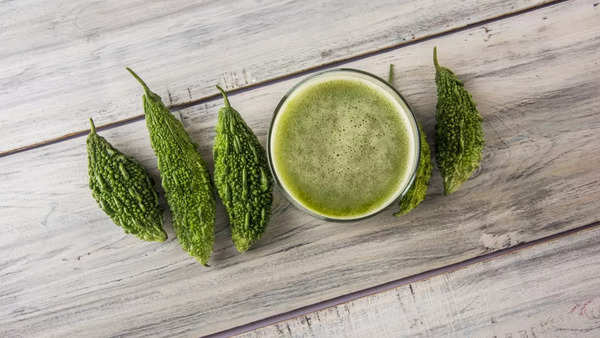Trending
This story is from September 30, 2023
The history of bitter gourd (karela) and why it is bitter in taste
Bitter gourd is such a vegetable whose name makes one smile when it hears it. The reason for this is its strong bitter taste. You may dislike the bitterness of bitter gourd, however, this vegetable can benefit your health in several ways. But have you ever wondered, where this vegetable was found for the first time and why does it taste so bitter? Here’s all you need to know about this ‘healthy’ vegetable.

Better known as bitter gourd or Karela, it is a green vegetable that grows on the vine, which has been included in the diet for many health problems for a long time. But, there are a very few people who like it. The reason is its bitter taste. Bitter gourds come in different colours and sizes. Indian bitter gourds are 4-inches long, whereas in China they are 8-inches long.Its size can change with changes in weather. It is widely included in Asian food. This vegetable is considered beneficial for many health problems due to its sharp and bitter taste. It is green from outside and white from inside. While cooking bitter gourd, its peel is removed because it is the most bitter. But, do you know where does it come from? Read more to find out…
ALSO READ: 5 foods you must avoid with bitter gourd (Karela)
You will be surprised to know that the bitter gourd which you have been looking at since childhood, was actually not found in India but was first found in Africa. Bitter gourd was the main food for Kung hunters in the dry season of Africa, it was also first seen there. With time, bitter gourd spread throughout Asia. With time people also came to know about its amazing benefits.

Bitter gourd contains non-toxic glycoside momordicin, which gives it bitterness and also provides benefits. The bitterness of bitter gourd is considered very good for stomach health. Bitter gourd activates the release of digestive juices in the stomach and also provides relief from stomach upset caused by overeating. Also repairs and protects the gastric mucosa damaged due to stress. On the other hand, if bitter gourd is consumed excessively, it may cause stomach ache, diarrhoea and other problems related to stomach and digestion for many people.

One cup of bitter gourd contains nutrients like protein, carbs, fats, fiber, vitamin A, B1, B2, C, calcium, iron, magnesium, phosphorus, zinc and potassium. The potassium present in bitter gourd removes excess water and salt accumulated in the body. If there is swelling in your body, it is better that you stay away from food containing too much salt. While the insoluble dietary fibre does not allow the stool to settle in the intestines and is easily removed from the body. Apart from this, dietary fibre provides food to the good bacteria present in the colon, which increases their number and maintains the health of your intestine. Bitter gourd contains Vitamin C, which can provide relief from cold. Vitamin C activates white blood cells and fights bacteria. However, Vitamin C is sensitive to heat, so drinking bitter gourd in the form of salad or juice may be more beneficial. Also, the folic acid present in bitter gourd plays an important role in supporting the production of red blood cells. Due to which you avoid anemia. And Vitamin B1 and B2 are necessary to convert sugar and fat into energy. It also works to remove weakness and prevent obesity. The calcium present in it is essential for the health of bones and teeth.
(Images courtesy: Canva)
ALSO READ: 5 foods you must avoid with bitter gourd (Karela)
You will be surprised to know that the bitter gourd which you have been looking at since childhood, was actually not found in India but was first found in Africa. Bitter gourd was the main food for Kung hunters in the dry season of Africa, it was also first seen there. With time, bitter gourd spread throughout Asia. With time people also came to know about its amazing benefits.

Why is it bitter and its benefits
Bitter gourd contains non-toxic glycoside momordicin, which gives it bitterness and also provides benefits. The bitterness of bitter gourd is considered very good for stomach health. Bitter gourd activates the release of digestive juices in the stomach and also provides relief from stomach upset caused by overeating. Also repairs and protects the gastric mucosa damaged due to stress. On the other hand, if bitter gourd is consumed excessively, it may cause stomach ache, diarrhoea and other problems related to stomach and digestion for many people.

Health Benefits Of Bitter Gourd
How bitter gourd helps?
(Images courtesy: Canva)
End of Article
FOLLOW US ON SOCIAL MEDIA








